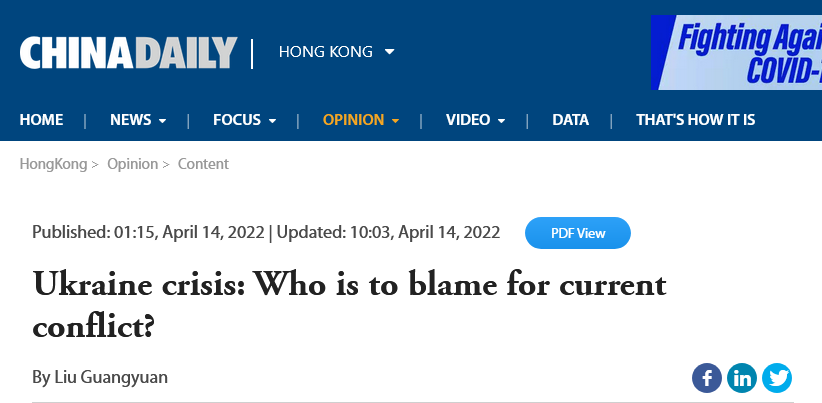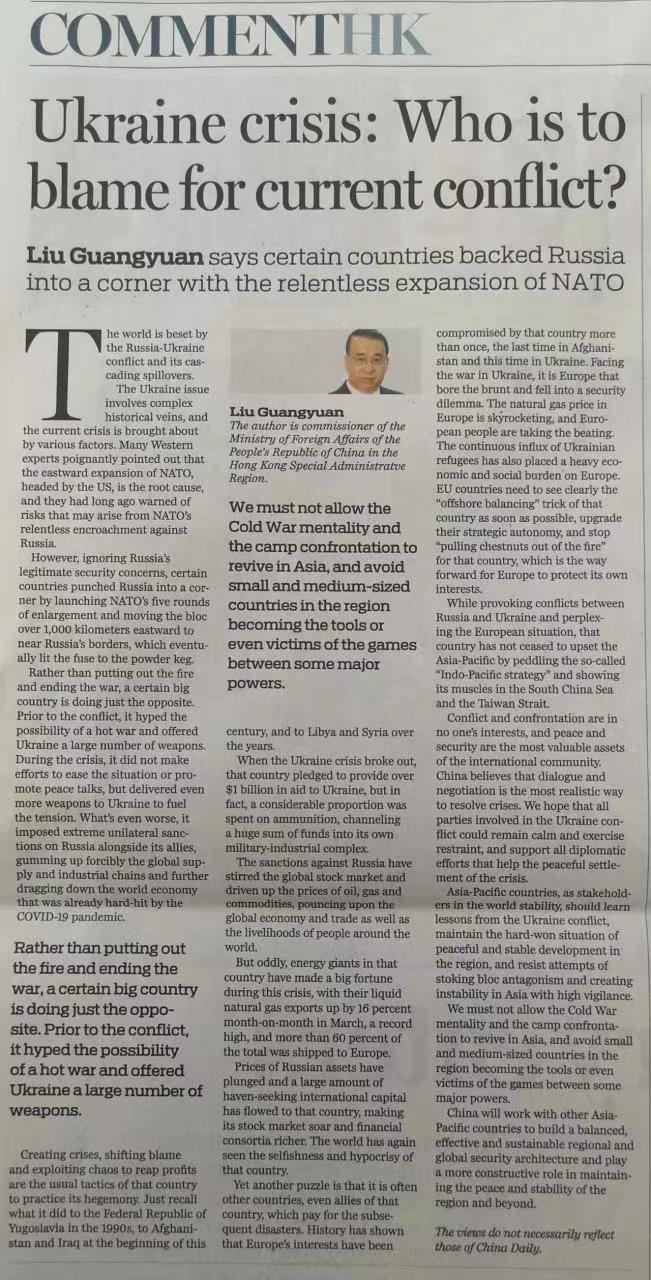2022年4月14日,外交部驻港公署刘光源特派员在《中国日报》发表题为《谁是“祸乱输出源”?》的英文署名文章,揭批个别大国挑动俄乌冲突并且不断拱火浇油、趁乱大发战争财的卑劣行径,提醒亚太国家吸取乌克兰危机的教训,对个别大国在本地区复活冷战思维、引入阵营对立保持警惕,呼吁共同构建均衡、有效、可持续的地区和全球安全架构。文章亦于当日在该报网页版刊登。全文如下:


谁是“祸乱输出源”?
近来,俄乌冲突成为国际风云突变的风暴眼,导致全球局势剧烈震荡,影响日益蔓延外溢。
乌克兰问题有非常复杂的历史背景和经纬,局势演变至今是各种因素共同作用的结果。很多西方著名国际问题专家一针见血地指出,以美国为首的北约东扩是危机的始作俑者,并曾就北约针对俄罗斯的持续扩张可能带来的风险提出过警告。然而,个别国家置俄罗斯正当合理安全关切于不顾,极限施压,挑起对抗,背信弃义推动北约五轮东扩,向东推进1000多公里直抵俄边境,一步步将俄逼到了墙角,也将俄乌矛盾推向了火山口。
个别大国一贯“点火不灭火”,生乱不止乱。乌克兰冲突爆发前,渲染危机,兜售战争,向乌克兰提供大量武器。冲突发生后,不但不为缓和局势、劝和促谈作出努力,还不断拱火浇油,向乌克兰“递刀”输送更多武器,坐视战火蔓延。同时,带头并煽动盟友对俄罗斯进行单边极限制裁,导致全球供应链产业链紊乱加剧,进一步拖累疫情下负重前行的世界经济。
制造危机、趁乱渔利、转移国内矛盾、为自身霸权“续命”是个别大国的惯用手段。上世纪90年代对南联盟,本世纪初对阿富汗和伊拉克,后来还有对利比亚、叙利亚,殷鉴不远。乌克兰危机爆发后,个别大国宣布向乌克兰提供的10多亿美元援助中,相当大比例都用来采购武器装备,变相给军工复合体“输血”,让其大发战争财。对俄罗斯制裁后,全球股市剧烈震荡,油气和大宗商品价格暴涨,严重冲击国际经济贸易和各国社会民生。然而,我们看到,个别大国能源巨头获利颇丰,3月份液化天然气出口量环比增加了近16%,创历史新高,其中对欧洲出口量占六成以上。俄罗斯资产被抄底,大量国际资本向个别大国流动,令其股市一涨再涨,金融资本财团通过投机赚得盆满钵满。世人再次看清了个别大国的自私虚伪。
为祸乱埋单的往往是其他国家,甚至包括个别大国的盟友。历史上欧洲的利益不止一次被个别大国出卖,上一次是在阿富汗,这次则是在乌克兰。战火发生在乌克兰,欧洲受到的影响首当其冲,陷入安全困境。欧洲天然气价格飙升,民众不堪重负。乌克兰难民源源不断涌入,给欧洲带来沉重经济和社会负担。欧盟国家需要早日看清个别大国的“离岸平衡”伎俩,从自身利益出发,增强战略自主,不要再为其“火中取栗”。
个别大国在挑起俄乌冲突、造祸欧洲的同时,也没忘记继续在亚太搅乱地区形势,卖力推进所谓“印太战略”,特别是加大在南海和台海“搅混水”。
冲突对抗不符合任何人的利益,和平安全才是国际社会最应珍惜的财富。中方始终主张,对话谈判才是化解危机最现实可行的方式。我们希望相关各方保持冷静克制,鼓励和支持一切有利于和平解决乌克兰危机的外交努力,共同推动局势降温。
作为利益攸关的亚太国家,我们要充分吸取乌克兰危机的教训,维护好本地区来之不易的和平稳定发展局面,高度警惕和大力抵制在亚洲引入阵营对立、制造动荡紧张的图谋。我们不能允许冷战思维在亚洲地区回潮,不能允许阵营对抗在亚洲地区重演,不能允许地区中小国家沦为大国博弈的工具甚至牺牲品。中方愿同地区其他国家一道,推动构建均衡、有效、可持续的地区和全球安全架构,为维护地区与世界和平稳定发挥更大建设性作用。
Ukraine crisis: Who is to blame?
The world is beset by the Russia-Ukraine conflict and its cascading spillovers.
The Ukraine issue involves complex historical veins and and the current crisis is brought about by various factors.. Many Western experts poignantly pointed out that the eastward expansion of NATO, headed by the US, is the root cause, and they had long ago warned of risks that may arise from NATO’s relentless encroachment against Russia.
However, ignoring Russia’s legitimate security concerns, certain countries punched Russia into a corner by launching NATO’s five rounds of enlargement and moving the bloc over 1,000 kilometers eastward to near Russia’s borders, which eventually lit the fuse to the powder keg.
Rather than putting out the fire and ending the war, a certain big country is doing just the opposite. Prior to the conflict, it hyped the possibility of a hot war and offered Ukraine a large number of weapons. During the crisis, it did not make efforts to ease the situation or promote peace talks, but delivered even more weapons to Ukraine to fuel the tension. What’s even worse, it imposed extreme unilateral sanctions on Russia alongside its allies, gumming up forcibly the global supply and industrial chains and further dragging down the world economy that was already hard-hit by the COVID-19 pandemic.
Creating crises, shifting blame and exploiting chaos to reap profits are the usual tactics of that country to practice its hegemony. Just recall what it did to the Federal Republic of Yugoslavia in the 1990s, to Afghanistan and Iraq at the beginning of this century, and to Libya and Syria over the years.
When the Ukraine crisis broke out, that country pledged to provide over $1 billion in aid to Ukraine, but in fact, a considerable proportion was spent on ammunition, channeling a huge sum of funds into its own military-industrial complex.
The sanctions against Russia have stirred the global stock market and driven up the prices of oil, gas and commodities, pouncing upon the global economy and trade as well as the livelihoods of people around the world.
But oddly, energy giants in that country have made a big fortune during this crisis, with their liquid natural gas exports up by 16 percent month-on-month in March, a record high, and more than 60 percent of the total was shipped to Europe.
Prices of Russian assets have plunged and a large amount of haven-seeking international capital has flowed to that country, making its stock market soaring and financial consortia richer. The world has again seen the selfishness and hypocrisy of that country.
Yet another puzzle is that it is often other countries, even allies of that country, which pay for the subsequent disasters. History has shown that Europe’s interests have been compromised by that country more than once, the last time in Afghanistan and this time in Ukraine. Facing the war in Ukraine, it is Europe that bore the brunt and fell into a security dilemma. The natural gas price in Europe is skyrocketing, and European people are taking the beating. The continuous influx of Ukrainian refugees has also placed a heavy economic and social burden on Europe. EU countries need to see clearly the “offshore balancing” trick of that country as soon as possible, upgrade their strategic autonomy, and stop “pulling chestnuts out of the fire” for that country, which is the way forward for Europe to protect its own interests.
While provoking conflicts between Russia and Ukraine and perplexing the European situation, that country has not ceased to upset the Asia-Pacific by peddling the so-called “Indo-Pacific strategy” and showing its muscles in the South China Sea and the Taiwan Straits.
Conflict and confrontation are in no one’s interests, and peace and security are the most valuable assets of the international community. China believes that dialogue and negotiation is the most realistic way to resolve crises. We hope that all parties involved in the Ukraine conflict could remain calm and exercise restraint, and support all diplomatic efforts that help the peaceful settlement of the crisis.
Asia-Pacific countries, as stakeholders in the world stability, should learn lessons from the Ukraine conflict, maintain the hard-won situation of peaceful and stable development in the region, and resist attempts of stoking bloc antagonism and creating instability in Asia with high vigilance.
We must not allow the Cold War mentality and the camp confrontation to revive in Asia, and avoid small and medium-sized countries in the region becoming the tools or even victims of the games between some major powers.
China will work with other Asia-Pacific countries to build a balanced, effective and sustainable regional and global security architecture and play a more constructive role in maintaining the peace and stability of the region and beyond.